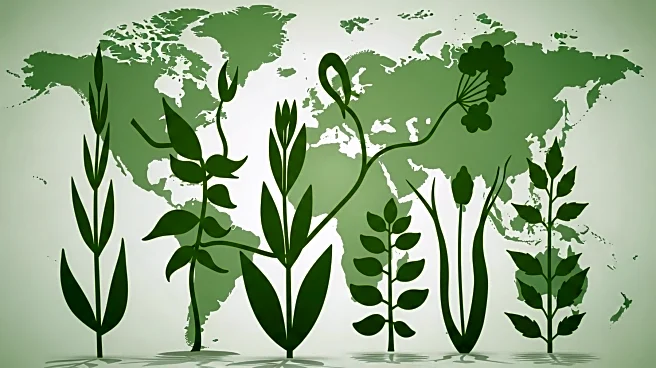What is the story about?
What's Happening?
An international research team led by the University of Konstanz has conducted a study on the spread of invasive plant species, focusing on their ability to thrive in non-native environments. The study examined 3,920 native plant species across ten European countries and compared their success in naturalizing globally. The findings suggest that plant species successful in their native habitats tend to become widespread as naturalized aliens in foreign ecosystems. These species are typically tall, ecologically versatile, and highly competitive, preferring nutrient-rich habitats. The study highlights the role of human influence in the spread of these plants, with Europe identified as a major exporter of naturalized species.
Why It's Important?
The spread of invasive plant species poses significant challenges to native ecosystems, often leading to the displacement of local flora and fauna. Understanding the traits that make certain plants successful invaders can help in developing strategies to manage and mitigate their impact. This research provides insights into the biological mechanisms that enable these plants to thrive in new environments, which is crucial for conservation efforts and maintaining biodiversity. The findings could inform policies aimed at controlling the introduction and spread of invasive species, thereby protecting native ecosystems and their inherent ecological balance.
What's Next?
The study suggests that monitoring the dynamics of native plant species in their home regions could offer valuable predictions about their potential to become invasive elsewhere. This approach could be integrated into environmental management practices to prevent the spread of invasive species. Further research may focus on identifying specific ecological gaps that these plants exploit, providing a more targeted approach to managing their spread. Collaboration between countries could enhance the effectiveness of these strategies, as invasive species often cross national borders.
Beyond the Headlines
The study raises ethical considerations regarding human responsibility in the spread of invasive species. As human activities continue to alter natural habitats, the introduction of non-native species becomes more prevalent, necessitating a reevaluation of conservation priorities. Additionally, the economic impact of invasive species on agriculture and forestry sectors could be significant, prompting stakeholders to invest in preventive measures. Long-term shifts in ecosystem dynamics may also occur, affecting climate regulation and other ecological services.
















